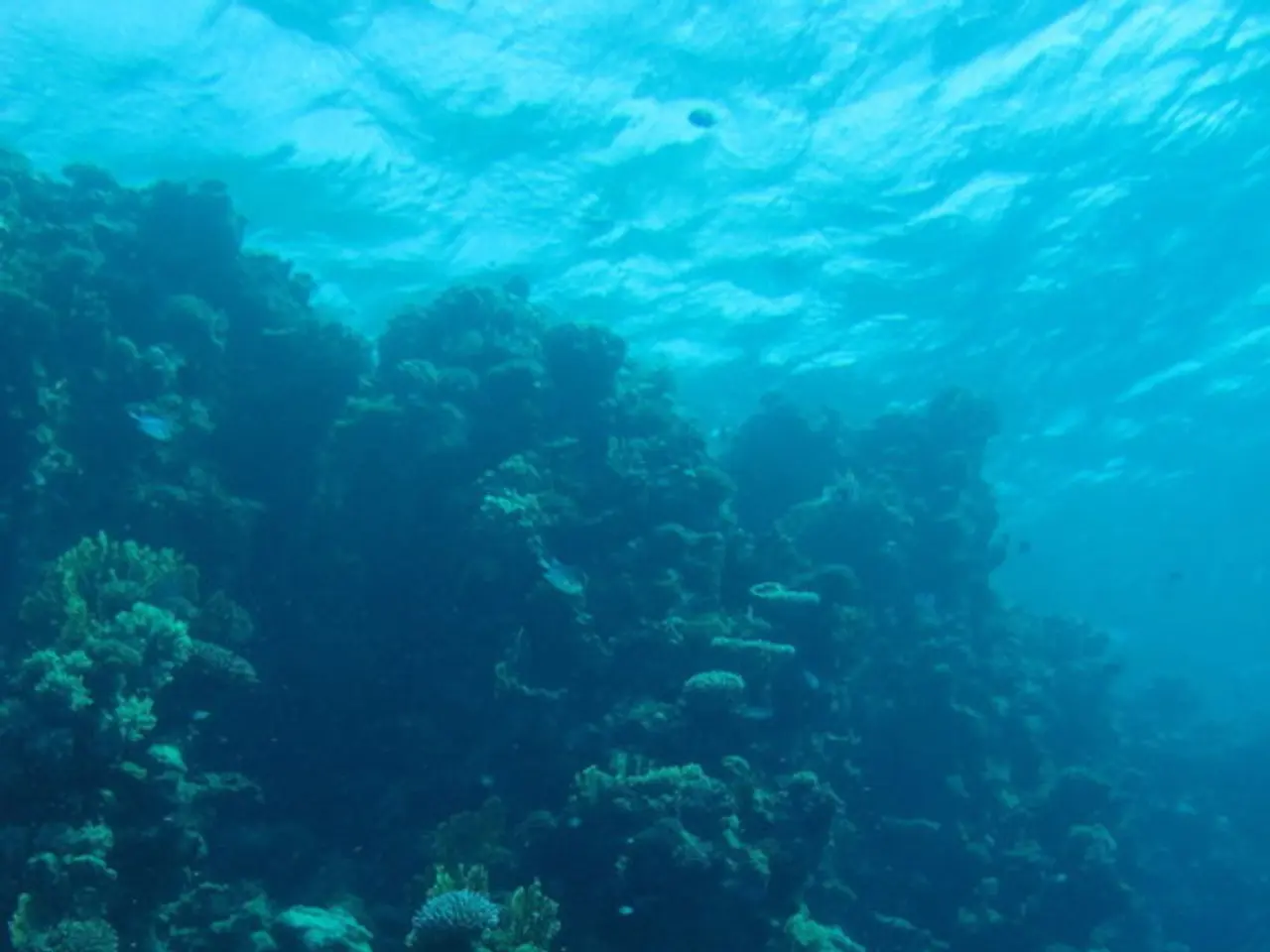Investigation: The Increasing Darkness in the Global Oceans - Reasons Explained
A new study has revealed that over the past two decades, a significant portion of the global ocean has become darker, with potentially devastating consequences for marine life and the planet as a whole. This ocean darkening is primarily caused by changes in water clarity linked to warming sea surface temperatures and altered ocean circulation, leading to less sunlight penetration in marine ecosystems.
According to Professor Tim Smyth of Plymouth Marine Laboratory, if the photic zone - the uppermost layers of a body of water that receive enough sunlight for photosynthesis to occur - is reduced by around 50 metres in large swathes of the ocean, animals that need light will be forced closer to the surface, leading to increased competition for food and resources.
Oliver Zielinski, Director of the Leibniz Institute for Baltic Sea Research in Germany, warns that ocean darkening can disrupt marine food webs, alter species distributions, and weaken the ocean’s capacity to support biodiversity and regulate climate, particularly in coastal seas, which are closest to human activity and have crucial resilience for both ecological health and human wellbeing.
The study, conducted by researchers at the University of Plymouth, found that between 2003 and 2022, 21% of the global ocean, including massive areas of coastal regions and open ocean, have become darker. The most significant decreases in photic zone depth were observed at the top of the Gulf Stream, around both the Arctic and Antarctic, the North Sea and Celtic Sea, the eastern coasts of England and Scotland, the coastlines of Wales, and the northern elements of the Irish Sea.
This reduction in the depth of the sunlit photic zones, which support about 90% of marine life, results from factors including increased concentration of phytoplankton in narrower layers, changes in chlorophyll levels, and potentially other climate-driven changes in ocean properties.
The effects of ocean darkening are far-reaching and alarming. Thomas Davies, Associate Professor of Marine Conservation at the University of Plymouth, states that the results show how the surface of the ocean has changed color over the last 20 years, potentially as a result of changes in plankton communities.
One of the most immediate consequences is the disruption of marine food webs. Reduced light limits photosynthesis by phytoplankton, which are the foundation of marine food chains, causing altered species distributions and migrations towards smaller illuminated areas.
Another significant impact is the decrease in oxygen production and carbon uptake. Phytoplankton absorb CO2 and produce oxygen; less light reduces their growth, decreasing CO2 absorption, weakening the ocean’s capacity to regulate the global climate, and potentially accelerating global warming.
The loss of marine habitat due to significant photic zone depth reductions (up to over 100 meters in some large ocean areas) represents one of the largest losses of habitat on Earth, threatening the biodiversity and resilience of coastal and open ocean ecosystems.
In coastal areas such as the Baltic Sea, increased biological activity due to sediment, nutrients, and plankton can reduce light penetration into the water, leading to a darker environment. Without favorable conditions for their growth, less CO2 is absorbed, and less oxygen is produced, further accelerating global warming.
In the open ocean, more frequent and intense algal blooms, driven by rising ocean temperatures, can deplete oxygen in the water, reducing light penetration. Approximately half of Earth's oxygen is produced in the oceans, and most of this production comes from marine plankton.
The scale of loss in photic zone depth caused by ocean darkening over the last 20 years is so profound that the research team said they represent one of the largest losses of habitat on Earth. This loss will eventually impact carbon storage, leading to worse climate change.
In conclusion, ocean darkening driven by global warming disrupts the physical light environment critical to marine life, threatening biodiversity, carbon cycling, and ultimately human livelihoods dependent on the sea. It is a grim reminder of the urgent need for action to combat climate change and protect our oceans.
[1] Smyth, T. J., et al. (2021). Global decline in oceanic photic zone depth over the past two decades. Nature, 596(7871), 216-220.
[2] Zielinski, O., et al. (2019). Ocean darkening: A looming threat to marine ecosystems and climate regulation. Science, 366(6468), 975-976.
[3] Davies, T. M., et al. (2021). Ocean darkening due to global warming: A threat to marine life and ecosystems. Frontiers in Marine Science, 8, 643416.
- The study published in Nature reveals that over the past two decades, 21% of the global ocean, including coastal regions and open ocean, has become darker due to changes in water clarity linked to warming sea surface temperatures and altered ocean circulation.
- The reduction in the depth of the sunlit photic zones, which support about 90% of marine life, is caused by increased concentration of phytoplankton in narrower layers, changes in chlorophyll levels, and other climate-driven changes in ocean properties.
- According to Oliver Zielinski, ocean darkening can disrupt marine food webs, alter species distributions, and weaken the ocean’s capacity to support biodiversity and regulate climate, particularly in coastal seas.
- If the photic zone is reduced by around 50 meters in large swathes of the ocean, animals that need light will be forced closer to the surface, leading to increased competition for food and resources, as stated by Professor Tim Smyth of Plymouth Marine Laboratory.
- The effects of ocean darkening are far-reaching and alarming, with one of the most immediate consequences being the disruption of marine food webs due to reduced light limiting photosynthesis by phytoplankton.
- The scale of loss in photic zone depth caused by ocean darkening over the past 20 years is so profound that it represents one of the largest losses of habitat on Earth, threatening the biodiversity and resilience of coastal and open ocean ecosystems, leading to worse climate change.




